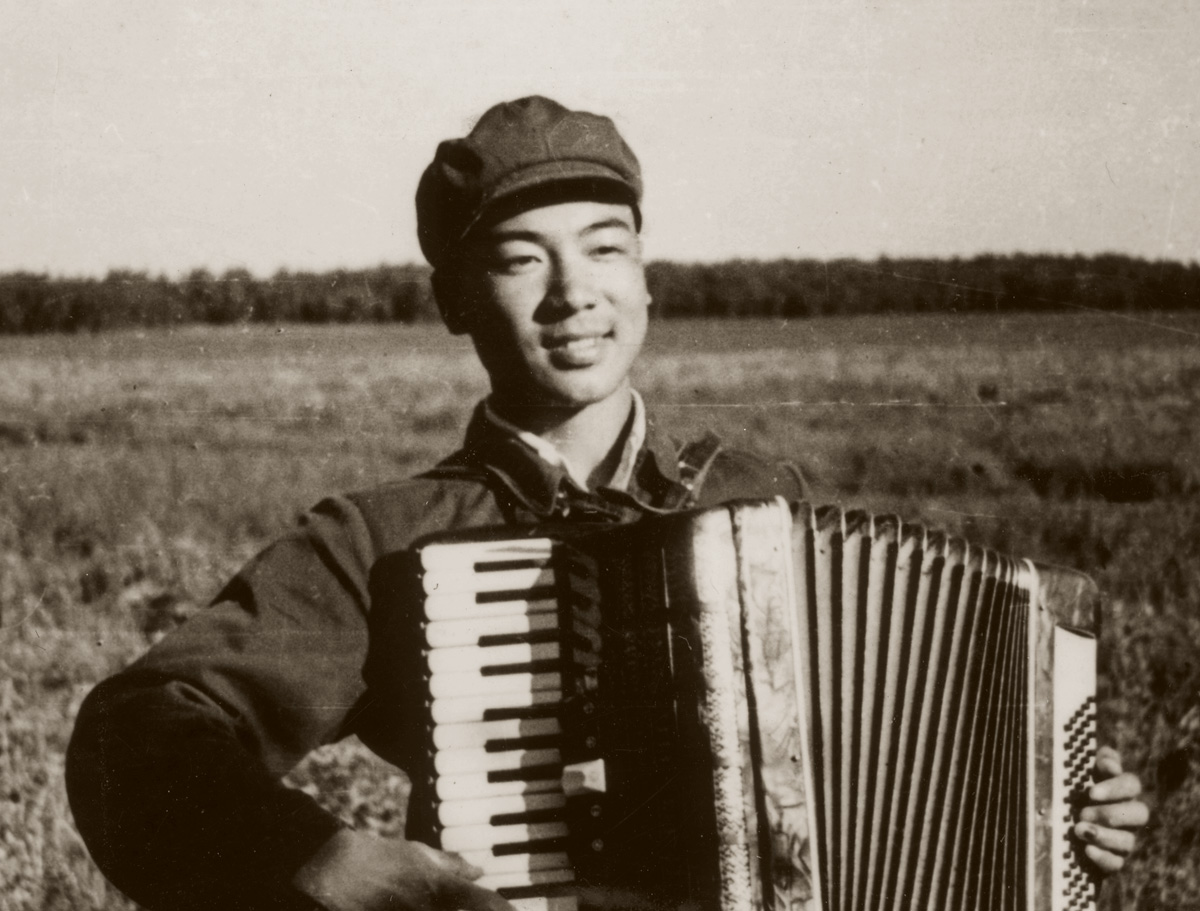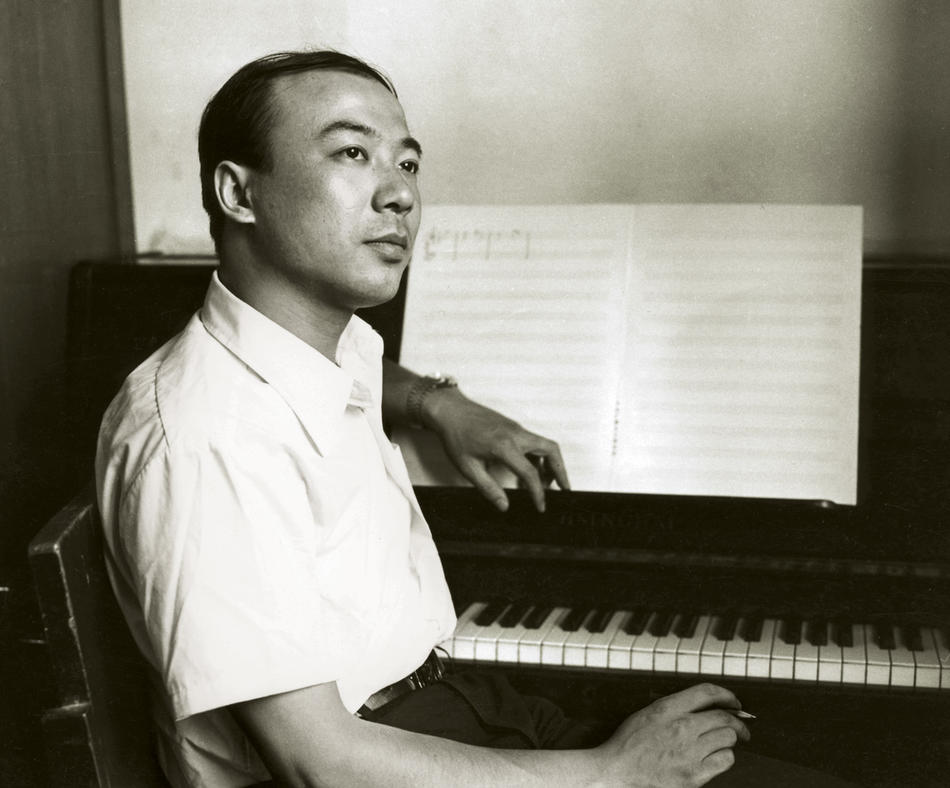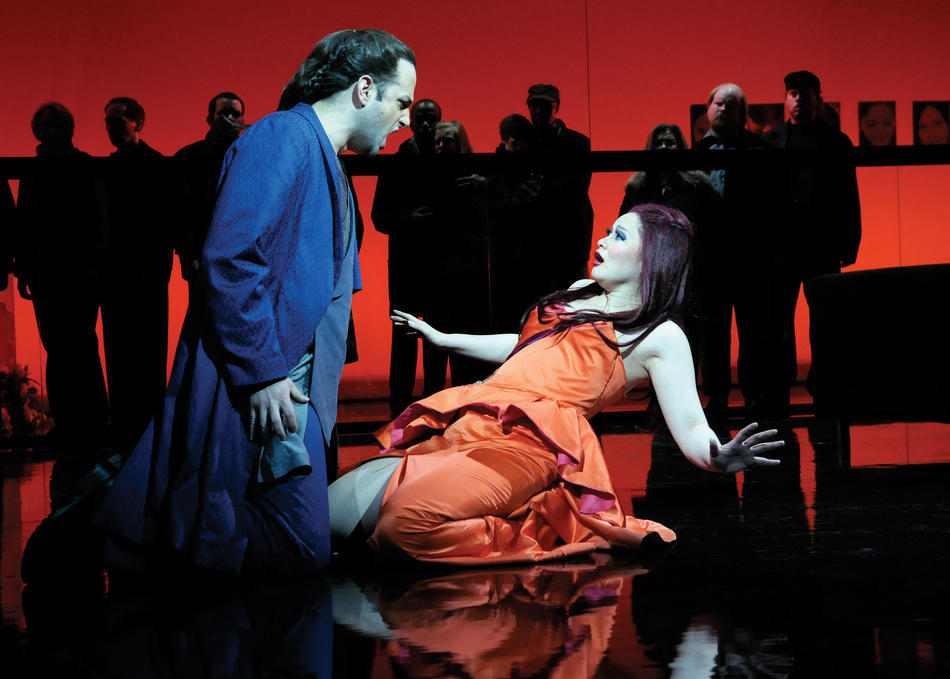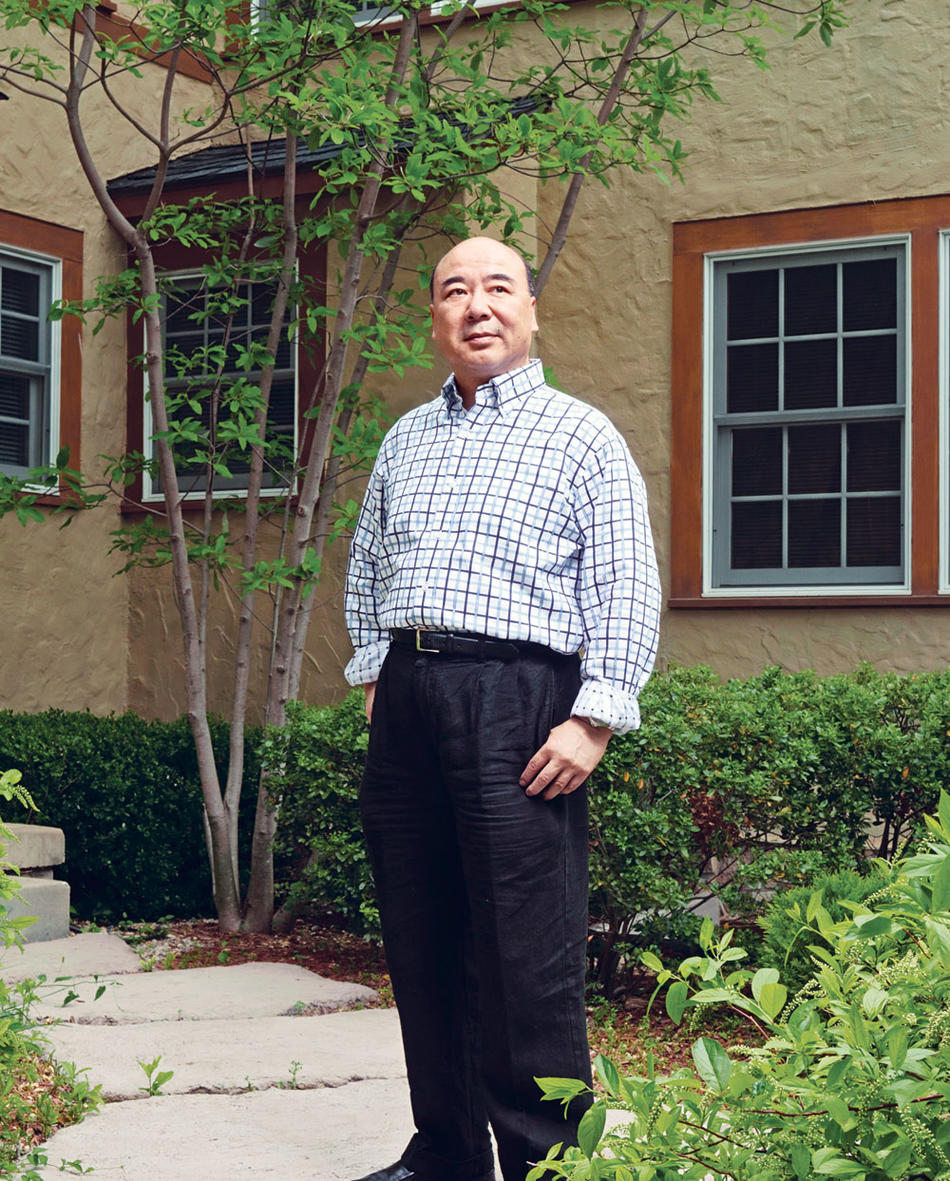
Puccini had disappeared.
It was September 1969, and 16-year-old Zhou Long, a student from Beijing, arrived in the harsh climate of China’s northeast Heilongjiang province, 1200 miles away from his family. His father was a painter and fine arts professor, and his mother a Western-style voice teacher. Zhou ’93GSAS, who had taken lessons in voice and piano, had been preparing for conservatory study. Now, he was assigned to drive a tractor, grow crops, and spend hours every day hauling heavy sacks of beans and wheat down a narrow gangplank to the granary. During the long winters, the winds roared and the temperatures averaged nine degrees Fahrenheit, sending the inhabitants into underground dwellings.
This was the Heilongjiang Production and Construction Corps, a state farm near Hegang City. Zhou desperately missed his family and his music, and tried to find solace in the only melodies allowed on the farm: revolutionary songs, which he taught himself to play on his accordion. “I played some operas from the Cultural Revolution, too,” he says. “But back home I had played art songs and listened to Puccini.”
But Puccini was gone. The Cultural Revolution, Mao’s brutal program of socialist orthodoxy that began in 1966, had expunged many things that smacked of the indulgent, capitalist West. Hundreds of thousands of city youth, like Zhou, left their families for the countryside, where they learned agricultural skills through manual labor. (The Chinese Communist Party allowed one child per household to remain at home; Zhou’s younger sister was assigned to be a weaver in a Beijing factory.) Universities were shut down, and the future of a generation of talented students was now uncertain. “I had no chance, no hope without higher education,” says Zhou. “I knew I would never become what I wanted to be: a composer.”
At Zhou Long’s home in Kansas City, Missouri, the walls are decorated with scrolls of Chinese calligraphy. The shelves hold books on 20th-century composers and music, color photos from Zhou’s life in America — graduation portraits, pictures of Zhou conducting, vacation snapshots — and a handful of small black-and-white images from his days on the state farm. There are also several classical music awards. This past spring, he added another: the 2011 Pulitzer Prize in music, for his opera Madame White Snake.
Described by the Pulitzer Committee as “a deeply expressive opera that draws on a Chinese folk tale to blend the musical traditions of the East and the West,” Madame White Snake is Zhou’s first opera and the first full-length operatic work to be awarded a Pulitzer since Robert Ward’s The Crucible in 1962. Zhou is the first Asian American composer to win the music prize, a fact he finds inspiring and humbling. “I thought I probably couldn’t win it because I wasn’t considered American,” he says. “But my wife never agreed with me. She said, ‘You are American. You should have a chance.’”
Chairman Mao’s death in 1976 brought an end to the Cultural Revolution. The next year, Zhou was returning to Beijing from a field trip collecting folk songs when he heard an astonishing announcement from the state radio over the train’s public-address system: China’s college entrance examination was to resume. “I couldn’t believe it,” says Zhou. “I had given up my dream of going to college.”
Once back in Beijing, he immediately applied to the prestigious Central Conservatory of Music, joining more than 1000 musicians competing for openings in the institution’s first regular class in more than a decade. Zhou was one of only 30 people selected for the so-called Class of ’77 (though instruction didn’t actually resume until 1978). At the conservatory, Zhou, who listened to a great deal of Western opera while growing up, learned more about traditional Chinese music. “Peking Opera and Chinese instruments are supposed to be my cultural background, but they’re not from my childhood and not in my blood,” says Zhou. There was a requirement for the first class after the Cultural Revolution to study traditional Chinese music, which, Zhou says, “was a smart idea, because almost everything had been lost.”
After he graduated in 1983, Zhou was posted to the National Broadcasting Symphony Orchestra of China as composer-in-residence, a powerful but undemanding position where he wrote 30-second music segments for state radio and television. The freedom and flexibility of his schedule gave him time for his own compositions, tonal works that drew heavily on his recent studies and interest in Tang Dynasty high culture. Nonetheless, he was already beginning to exhibit a modernist, experimental sensibility. His string quartet Song of the Ch’in, for example, which won first prize in the Chinese National Composition Competition in 1985, transfers the idiomatic sounds of the ch’in — an ancient seven-stringed instrument similar to a zither — to a Western string quartet.
The prize might have been a sign of things to come, but 1985 held an even bigger event for Zhou.
Chou Wen-Chung ’54GSAS had already been at Columbia for nearly 25 years when he established the U.S.-China Arts Exchange in 1978. The Chinese-born composer and Columbia music professor saw the potential presented by the end of the Cultural Revolution and began traveling to China, giving lectures at the country’s top conservatories, meeting cultural and political leaders, and establishing the relationships that would eventually allow him to bring students back to Columbia to study.
“After the Chinese government reopened the universities, there were so many talented students to select from,” says Chou, now an 88-year-old professor emeritus. “My idea was to try to bring out as many as possible and to let them experience cultural life in the United States. Bright Chinese teenagers were just waiting.”
Not just teenagers. Zhou was a student in his mid-20s when Chou gave a master class at the Central Conservatory. “Although I didn’t meet him until years later,” Zhou recalls, “I felt I had found my mentor.”
By 1985, Zhou was 32 and working as a professional composer when he sent some scores and cassettes of his chamber work to Chou. With Chou’s encouragement, Zhou applied and was admitted to Columbia’s DMA (doctor of musical arts) program. His wife, the violinist and composer Chen Yi ’93GSAS, whom he met while at the conservatory, followed one year later.
Zhou struggled with the transition. He spent most of his time studying English, but had such difficulty learning the language that Chou managed to have the language qualification for his doctoral degree waived. Zhou was also so “confused” by New York City’s cultural diversity and varied musical offerings that he shut down creatively, unable to compose for the first two years he lived there. “It was a huge shock coming from a closed country,” he says. “It was not just American culture. New York is an international, cosmopolitan city. It was everything together. I needed time to digest it all.”
Zhou was equally unprepared for the musical environment at Columbia.
“In China, we didn’t know what was happening in the States,” he says. “We heard some impressionism, some Debussy. But we didn’t learn about living 20th-century composers and couldn’t access the scores and recordings.” Columbia emphasized a highly modernist compositional style at odds with Zhou’s tonal approach. “I had been writing tonally from the start,” he says. “I got the sense that I couldn’t stay in tonality at Columbia, and initially it was difficult for me to make the turn. I wanted to defend my compositional background. I started to feel ashamed of anything I wrote in a tonal style, because I thought it wouldn’t be accepted.”
When he did compose again, Zhou entered what he calls his Buddhist period, creating music that explores Buddhism’s inherently dualistic precepts, such as being and nothingness, concentration of thought and expansion of consciousness. In the nine-and-a-half-minute-long chamber work Dhyana, for example, complex pitches and dense, disjointed rhythms relax and open up into slower, simpler, sonic spaciousness; scattered, worldly thoughts coalesce into a focused serenity. While the spiritual significance of this period, which ran roughly from 1987 to 1994, shouldn’t be overlooked, Zhou stresses that his reasons for pursuing Buddhist philosophies were more practical than religious. “I was frustrated, I was aimless, and I felt I got lost,” he says. “For me, it was a creative turning point. I had to really clean up my mind. I thought that Buddhism could help me to concentrate, to focus, to think quietly about what I was doing here and aiming for.”
During that time, Zhou began to move away from tonality and experiment with free atonality, marrying contemporary Western musical theory with traditional Chinese instruments and subjects.
Once he heard and studied more contemporary music, he says, “It was like I’d jumped out of a box. I felt as if I had more freedom, more choices. I spent so much time at the Performing Arts Library at Lincoln Center listening to 20th-century Western music intensively and studying scores. I was fascinated by George Crumb and his graphic scores, so I would go to a corner and look for other irregularly sized, photocopied scores. I knew they would be interesting.”
In 1985, Zhou joined the ensemble Music from China and became its music director. He expanded the repertoire of the New York–based group — formed to present concerts of traditional Chinese music in the U.S. — to include contemporary Chinese works in Eastern and Western musical languages. His work with the group was well received: In 1999, ASCAP presented Zhou with its Adventurous Programming Award.
Since he came to America, Zhou’s music has been shaped by the question of cultural identity. The American Academy of Arts and Letters, which honored him with its Arts and Letters Award in Music in 2003, stated that “unlike many composers of today working between cultures, Zhou Long has found a plausible, rigorous, and legitimate way of consolidating compositional methods and techniques that allow him to express brilliantly both his experiences as a composer of Western music and his considerable knowledge of his native China.”
That’s significant, especially given that Zhou’s Chinese American colleagues Tan Dun ’93GSAS and Bright Sheng ’93GSAS had by that time made a more visible impact on the classical-music scene. Tan won an Oscar and a Grammy for his soundtrack to Ang Lee’s Crouching Tiger, Hidden Dragon in 2000, and in 1999 Bright was commissioned by President Bill Clinton to compose a work honoring the visiting Chinese premier Zhu Rongji.
“Out of the whole group that came here from China, Zhou Long has been the hardest to follow,” says Ken Smith, Asian performing arts critic for the Financial Times. “If you lay all of these composers’ pieces end-to-end, you can really see a musical progression that corresponds to major changes in their lives — when they went to conservatory in China and then in the U.S. But Zhou’s changes are not that pronounced. He was the most Western of the group when he was in China. In many ways, his pieces from China don’t sound much different from his pieces today. You can anticipate the mature composer in those early works.”
By the late 1990s and early 2000s, critics began comparing Zhou, Tan, Bright, and Chen Yi. But according to Ken Smith, this first generation of post–Cultural Revolution composers — all of whom attended Columbia at the same time, studied with Chou, received their doctorates in the same year, and worked to blend Eastern and Western musical languages in their compositions — couldn’t have been more different from each other.
“They came from different corners of China, and, once they hit the ground in New York, they went in different directions,” says Smith. “That said, there are few moments in history where you can trace a change in musical life back to one particular class the way you can with theirs.”
Zhou’s former classmates had already written several Chinese American hybrids, most notably Tan’s The First Emperor, which had its world premiere at the Metropolitan Opera in 2006, and Bright’s Madame Mao, which was performed at the Santa Fe Opera in 2003. Zhou doesn’t begrudge his colleagues’ success, but he does tire of being regularly asked about them, even during interviews about his own opera. “I am low-key,” he says. “I don’t have a manager. I don’t have a publicist. When I won the Pulitzer, the press once again wanted to put me in this group. I told them I’ve never been in any circle. I just work on my own, and work quietly. I don’t even have a particular style. I don’t reject anything: I look at everything equally.”
Madame White Snake was commissioned by Opera Boston and the Beijing Music Festival. It is Zhou’s most ambitious project and perhaps his most overt synthesis of Eastern and Western musical traditions. The opera is based on a popular 1000-year-old Chinese folk tale, retold in English by librettist Cerise Lim Jacobs. It is the story of a powerful white snake demon that transforms itself into a beautiful woman to experience love, but is, in the end, betrayed by her suspicious husband. A Peking Opera–style prelude and postlude, which formally describe the action, frame four acts, each introduced by a children’s chorus singing a Tang Dynasty poem describing the four seasons.
“The opera functions almost like a symphony,” says Gil Rose, artistic director of Opera Boston and conductor of the work’s world premiere in February 2010. “Other operas do this, like Puccini’s La Bohème. The first act is expository, the second is a scherzo in a major key, the third is a scherzo in a minor key, and the fourth is a minor-key resolution. Madame White Snake works in a similar fashion and finds the through line of symphonic work.”
Zhou’s vocal and orchestral music for the opera unfolds over 100 taut minutes and spans centuries as well as continents. There is no intermission.
Singers alternate among traditional operatic set pieces, Schoenbergian Sprechstimme, Peking Opera’s stylized rhythms, and precipitous vocal slides. The chamber-sized orchestra features Eastern and Western instruments, and the music moves seamlessly from clashing dissonances and percussive rhythms into sweeping, Pucciniesque melodies that lend surprising accessibility to the opera’s complex and often atonal score. “Zhou has a highly developed sense of the dramatic in his music,” says Rose, “and has a really good handle on pacing, which you can hear even in his orchestral work. Like Puccini, he knows how to hold his audience.”
Puccini has always been Zhou’s favorite opera composer (“He wrote some of the most beautiful melodies in the world”) and was the only composer whose scores Zhou consulted while working on Madame White Snake, primarily to study Puccini’s treatments of vocal lines. “Puccini is heavily orchestrated,” says Zhou, “but he also gives space to the voice.” Zhou didn’t attend a single concert while writing the opera, and even refrained from listening to recordings, so as not to be swayed by outside influences. “I didn’t want to hear any other music. Only what was in my head.”
It took Zhou three years to complete Madame White Snake. The process was so psychologically draining and overwhelming that he shut down after the project was completed and didn’t compose again for a full year. “My feelings are reflected in my process,” he says, “which is very slow and very careful. For the past few years, my heart had been with the opera. When the score was done, I felt depressed for a long time.”
Zhou Long seems well suited to the slow pace and quiet life of America’s heartland, where he moved 12 years ago to teach composition alongside Chen Yi at the University of Missouri–Kansas City Conservatory of Music and Dance. The couple’s comfortable high-rise apartment has room for dedicated studio spaces for each; its inviting living area, with large windows overlooking the nearby Nelson-Atkins Museum of Art, is centered around a wooden dining table, where Zhou and Chen discuss their music and students over steaks, mashed taro, and steamed bok choy, or while sipping Chinese fermented Pu-erh tea, a favorite of Zhou’s.
The refrigerator in the extra-long galley kitchen is covered with Chinese takeout menus. A map of the United States is taped to the kitchen wall, and, though the couple has no children, “American Presidents” and “Animal Alphabet” placemats lie on the bistro table and counter. “It’s educational,” says Chen enthusiastically, as ebullient as her husband is restrained. “It helps us to improve our English. At the start of the school year, we follow all the parents to Costco to get these things.”
Zhou clearly has adapted to American culture. Yet it took writing a Western-style opera and winning the Pulitzer for the composer to finally feel accepted by his adopted country. “I’ve lived here for almost 30 years,” he says, as he puffs on his pipe, “and have been entirely working to blend the cultures. I think that I carefully combined Western and Eastern cultures, and that I did it well. I don’t want Madame White Snake to taste like wine and beer mixed together. You can’t ever say that you have the right or perfect result, but I believe in what I did.
“The Pulitzer gave me more confidence,” he says. “It’s a quintessentially American award. That it could be offered not only to American-born composers, but to a composer who immigrated to the United States and became an American citizen, really means something to me. Now I feel like an American.”





